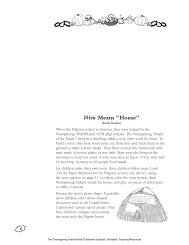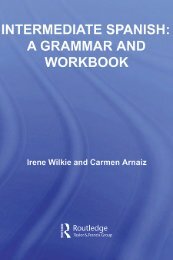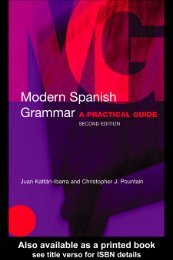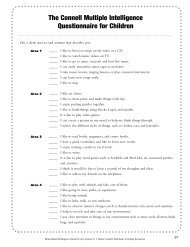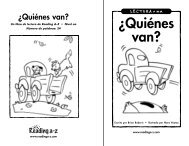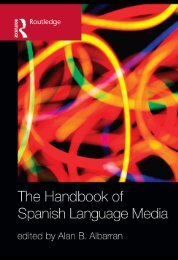- Page 2 and 3: Spanish Verbs Made Simple(r)
- Page 4 and 5: David Brodsky Spanish VERBS Simple(
- Page 6 and 7: For Daniel, Michael, and Beatriz
- Page 8 and 9: Contents Preface ix Introduction 1
- Page 10 and 11: Preface The fundamental aim of this
- Page 12 and 13: Spanish Verbs Made Simple(r)
- Page 14 and 15: Introduction The structure of Spani
- Page 16 and 17: There are in addition a number of c
- Page 18 and 19: in the verbal system. This is illus
- Page 20 and 21: Those in the second group are “fu
- Page 22 and 23: examples, it offers a feature found
- Page 24 and 25: PART I FORMS OF VERBS
- Page 26 and 27: CHAPTER 1 Present, Simple Past, Imp
- Page 30 and 31: Thus, infinitive past participle -a
- Page 32 and 33: exprimir (“to express”), and re
- Page 34 and 35: Also: ir yendo *iendo (3) -er and -
- Page 36 and 37: A. e → ie pronounced like “ye
- Page 38 and 39: IRREGULARITIES: PRESENT TENSE 25 ce
- Page 40 and 41: IRREGULARITIES: PRESENT TENSE 27 Co
- Page 42 and 43: IRREGULARITIES: PRESENT TENSE 29 Fo
- Page 44 and 45: eír “to laugh” freír “to fr
- Page 46 and 47: IRREGULARITIES: PRESENT TENSE 33 ob
- Page 48 and 49: B. (All) Infinitives Ending in -uci
- Page 50 and 51: IRREGULARITIES: PRESENT TENSE 37 1p
- Page 52 and 53: IRREGULARITIES: PRESENT TENSE 39 Ap
- Page 54 and 55: abstener(se) me abstengo “to abst
- Page 56 and 57: IRREGULARITIES: PRESENT TENSE 43 I.
- Page 58 and 59: CHAPTER 3 Irregularities: Simple Pa
- Page 60 and 61: (ii) Ser and ir have regular ending
- Page 62 and 63: Comments (i) and (ii) for -u stems,
- Page 64 and 65: except the first person plural, in
- Page 66 and 67: future tense led naturally to the d
- Page 68 and 69: -ir verbs subjunctive indicative 1s
- Page 70 and 71: -ir verbs sentir dormir 1s sienta d
- Page 72 and 73: SUBJUNCTIVE AND IMPERATIVE 59 All O
- Page 74 and 75: argüir discernir 1s present indica
- Page 76 and 77: Note that: SUBJUNCTIVE AND IMPERATI
- Page 78 and 79:
SUBJUNCTIVE AND IMPERATIVE 65 indic
- Page 80 and 81:
CHAPTER 6 Compound Verb Forms All c
- Page 82 and 83:
habré subido I will have climbed h
- Page 84 and 85:
CHAPTER 7 Orthographic Modification
- Page 86 and 87:
five sounds which have alternative
- Page 88 and 89:
Note that verbs with consonant -j n
- Page 90 and 91:
a diphthong -io or -ie. As in Spani
- Page 92 and 93:
orthographic written accent changes
- Page 94 and 95:
like criar, where the stress falls
- Page 96 and 97:
Other examples of verbs with stems
- Page 98 and 99:
Other examples: no written accents
- Page 100 and 101:
9. Combinations of Changes The verb
- Page 102 and 103:
Other verbs affected by this change
- Page 104 and 105:
CHAPTER 8 Vosotros/Ustedes and Tute
- Page 106 and 107:
attention to tú on the grounds tha
- Page 108 and 109:
VOSOTROS/USTEDES AND TUTEO/VOSEO 95
- Page 110 and 111:
SUMMARY AND PRESENTATION OF VERB CL
- Page 112 and 113:
SUMMARY AND PRESENTATION OF VERB CL
- Page 114 and 115:
III. Irregular First Person Singula
- Page 116 and 117:
TABLE 9.1. FUNDAMENTAL IRREGULARITI
- Page 118 and 119:
SUMMARY AND PRESENTATION OF VERB CL
- Page 120 and 121:
PART II USES OF VERBS
- Page 122 and 123:
CHAPTER 10 Indicative Present Tense
- Page 124 and 125:
Spain (generally) He leído el peri
- Page 126 and 127:
El cuadro está torcido. “The pic
- Page 128 and 129:
analogous construction is used with
- Page 130 and 131:
What did I say, or rather, mean to
- Page 132 and 133:
Probably the most common use of the
- Page 134 and 135:
Thus one says that el niño está d
- Page 136 and 137:
Future Perfect The Spanish use of t
- Page 138 and 139:
levantar “to lift” levantarse
- Page 140 and 141:
Apart from its role as an auxiliary
- Page 142 and 143:
La bandera es azul. “The flag is
- Page 144 and 145:
SPECIAL TOPIC: SER VERSUS ESTAR 131
- Page 146 and 147:
Passive and “False Passive” Con
- Page 148 and 149:
A potential confusion arises if one
- Page 150 and 151:
SPECIAL TOPIC: SER VERSUS ESTAR 137
- Page 152 and 153:
SUBJUNCTIVE 139 precepts. The diffi
- Page 154 and 155:
SUBJUNCTIVE 141 posture with regard
- Page 156 and 157:
SUBJUNCTIVE 143 Nonetheless, one oc
- Page 158 and 159:
SUBJUNCTIVE 145 As with English, in
- Page 160 and 161:
SUBJUNCTIVE 147 Me molesta no poder
- Page 162 and 163:
SUBJUNCTIVE 149 When some expressio
- Page 164 and 165:
SUBJUNCTIVE 151 Si has leído todos
- Page 166 and 167:
subjunctive SUBJUNCTIVE 153 No quie
- Page 168 and 169:
Conjunctions of Purpose Always Foll
- Page 170 and 171:
hasta que “until” mientras “w
- Page 172 and 173:
SUBJUNCTIVE 159 When the imperfect
- Page 174 and 175:
SUBJUNCTIVE 161 With expressions of
- Page 176 and 177:
SUBJUNCTIVE 163 Consider, for examp
- Page 178 and 179:
PART III ANNEXES
- Page 180 and 181:
ANNEX A Models of Verb Classes and
- Page 182 and 183:
33. traer 34. -ducir 35. andar On t
- Page 184 and 185:
MODELS OF VERB CLASSES AND SUB-CLAS
- Page 186 and 187:
1-11 G S GU CABRAHIGAR TO CAPRIFICA
- Page 188 and 189:
SUBJUNCTIVE Present Imperfect (I) I
- Page 190 and 191:
3 SUBIR TO RAISE, TO CLIMB INDICATI
- Page 192 and 193:
MODELS OF VERB CLASSES AND SUB-CLAS
- Page 194 and 195:
4A-1 DIPHTHONG E S IE NEGAR TO DENY
- Page 196 and 197:
4B-3 DIPHTHONG O S UE FORZAR TO FOR
- Page 198 and 199:
SUBJUNCTIVE Present Imperfect (I) I
- Page 200 and 201:
SUBJUNCTIVE Present Imperfect (I) I
- Page 202 and 203:
SUBJUNCTIVE Present Imperfect (I) I
- Page 204 and 205:
SUBJUNCTIVE Present Imperfect (I) I
- Page 206 and 207:
SUBJUNCTIVE Present Imperfect (I) I
- Page 208 and 209:
9-2 ALTERNATE FORMS ROER TO GNAW IN
- Page 210 and 211:
SUBJUNCTIVE Present Imperfect (I) I
- Page 212 and 213:
SUBJUNCTIVE Present Imperfect (I) I
- Page 214 and 215:
SUBJUNCTIVE Present Imperfect (I) I
- Page 216 and 217:
SUBJUNCTIVE Present Imperfect (I) I
- Page 218 and 219:
SUBJUNCTIVE Present Imperfect (I) I
- Page 220 and 221:
SUBJUNCTIVE Present Imperfect (I) I
- Page 222 and 223:
28-2 BENDECIR TO BLESS In future, c
- Page 224 and 225:
30-1 SUPONER TO SUPPOSE For imperat
- Page 226 and 227:
33 TRAER TO BRING, -GO IRREGULAR SI
- Page 228 and 229:
ANNEX B Index by Class and Sub-clas
- Page 230 and 231:
Verb Class (Sub-class) # acribillar
- Page 232 and 233:
Verb Class (Sub-class) # algodonar
- Page 234 and 235:
Verb Class (Sub-class) # aposentar
- Page 236 and 237:
Verb Class (Sub-class) # atontolina
- Page 238 and 239:
Verb Class (Sub-class) # caer caer
- Page 240 and 241:
Verb Class (Sub-class) # clausurar
- Page 242 and 243:
Verb Class (Sub-class) # consonanti
- Page 244 and 245:
Verb Class (Sub-class) # defraudar
- Page 246 and 247:
Verb Class (Sub-class) # descollar
- Page 248 and 249:
Verb Class (Sub-class) # desliar ca
- Page 250 and 251:
Verb Class (Sub-class) # devorar ca
- Page 252 and 253:
Verb Class (Sub-class) # embrollar
- Page 254 and 255:
Verb Class (Sub-class) # enfilar ca
- Page 256 and 257:
Verb Class (Sub-class) # erotizar c
- Page 258 and 259:
Verb Class (Sub-class) # exclamar c
- Page 260 and 261:
Verb Class (Sub-class) # fraccionar
- Page 262 and 263:
Verb Class (Sub-class) # historiar
- Page 264 and 265:
Verb Class (Sub-class) # insonoriza
- Page 266 and 267:
Verb Class (Sub-class) # linchar ca
- Page 268 and 269:
Verb Class (Sub-class) # mitificar
- Page 270 and 271:
Verb Class (Sub-class) # palmotear
- Page 272 and 273:
Verb Class (Sub-class) # poner pone
- Page 274 and 275:
Verb Class (Sub-class) # racionaliz
- Page 276 and 277:
Verb Class (Sub-class) # refreír 2
- Page 278 and 279:
Verb Class (Sub-class) # resplandec
- Page 280 and 281:
Verb Class (Sub-class) # sextuplica
- Page 282 and 283:
Verb Class (Sub-class) # susurrar c
- Page 284 and 285:
Verb Class (Sub-class) # triunfar c
- Page 286:
Selected References Alarcos Llorach



